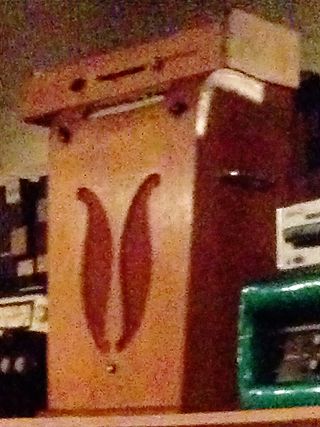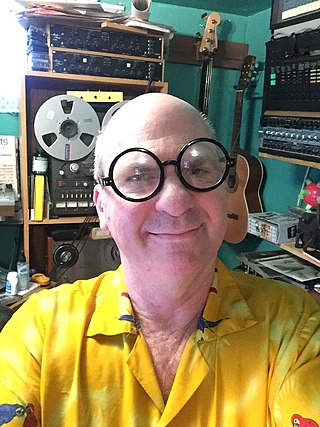
George Bernard Worrell, Jr. was an American keyboardist and record producer best known as a founding member of the Parliament-Funkadelic collective. In later years, he also worked with acts such as Talking Heads, Bill Laswell, and Jack Bruce. He is a member of the Rock and Roll Hall of Fame, inducted in 1997 with fifteen other members of Parliament-Funkadelic. Worrell was described by journalist Jon Pareles as "the kind of sideman who is as influential as some bandleaders," with his use of synthesizers particularly impactful on funk and hip hop.

Luke Vibert is a British electronic musician and producer, also known for his work under several aliases such as Plug and Wagon Christ. Raised in Cornwall, Vibert began releasing projects in the 1990s across varied genres, including techno, drum and bass, and trip hop. He has recorded on labels such as Rephlex, Ninja Tune, Planet Mu, and Warp.
Perrey and Kingsley was an electronic music duo made up of French composer Jean-Jacques Perrey and German-American composer Gershon Kingsley. The duo lasted from 1965 to 1967 and both are considered pioneers of electronic music. They released under Vanguard Records two studio albums The In Sound From Way Out! and Kaleidoscopic Vibrations. They also were among the first artists to incorporate the Moog synthesizer, prior to the successful 1968 release, Switched-On Bach by Wendy Carlos.

The Moog Cookbook was an American electronic duo consisting of Meco Eno and Uli Nomi. The project was a parody of and tribute to the novelty Moog records of the late 1960s and early 1970s, which featured cover versions of popular songs using the then-new Moog synthesizer.
Paul Henry Beaver Jr. was an American musician who was a pioneer in popular electronic music, using the Moog synthesizer. From 1967, Beaver collaborated with Bernie Krause as the recording duo Beaver & Krause.

Charles Alexander Clouser is an American keyboardist, composer, record producer, and remixer. He worked with Trent Reznor for Nine Inch Nails from 1994 to 2000, and is a composer for film and television; among his credits are the score for the Saw franchise and American Horror Story. Clouser was nominated for two Grammy Awards for Best Metal Performance in 1997.

The Moog synthesizer is a modular synthesizer invented by the American engineer Robert Moog in 1964. Moog's company, R. A. Moog Co., produced numerous models from 1965 to 1981, and again from 2014. It was the first commercial synthesizer and established the analog synthesizer concept.
Brian Kehew is an American musician and record producer. He is a member of The Moog Cookbook and co-author of the Recording The Beatles book, an in-depth look at the Beatles' studio approach.
Gershon Kingsley was a German-American composer, a pioneer of electronic music and the Moog synthesizer, a partner in the electronic music duo Perrey and Kingsley, founder of the First Moog Quartet, and writer of rock-inspired compositions for Jewish religious ceremonies. Kingsley is most famous for his 1969 influential electronic instrumental composition "Popcorn".

The Ondioline is an electronic analog synthesizer, developed and built by Frenchman Georges Jenny. Sometimes referred to as the "Jenny Ondioline," the instrument is considered a forerunner of the synthesizer. First conceived by Jenny in 1939, he continued refining and reconfiguring the device, producing dozens of variant models up until his death in 1975.
"Baroque Hoedown" is an instrumental by the duet Perrey and Kingsley. Original from 1967 album Kaleidoscopic Vibrations a follow-up to their previous 1966 album, The In Sound From Way Out!. The two albums were reissued in 1988 on one compilation album entitled The Essential Perrey and Kingsley.

Jean Marcel Leroy, better known as Jean-Jacques Perrey, was a French electronic music performer, composer, producer, and promoter. He is considered a pioneer of pop electronica. Perrey partnered with composer-performer Gershon Kingsley to form the electronic music duo Perrey and Kingsley, who issued some of the first commercial recordings featuring the Moog synthesizer. Perrey was also one of the first to promote, perform, and record with the Ondioline, developed by Georges Jenny.

Vincent Edward Gambella, known as Vinnie Bell, was an American session guitarist, instrument designer and pioneer of electronic effects in pop music.

Moog Indigo is the ninth studio album by the French electronic music pioneer Jean-Jacques Perrey, released in 1970 on the Vanguard Records label. The name album is a reference to Jazz song "Mood Indigo" by Duke Ellington.

Dana Countryman is an American electronic music composer, songwriter and performer notable for his sustained presence in the Seattle Pop scene as well as his collaborations with French electropop artist Jean-Jacques Perrey. He is also well known as songwriter and performer for The Amazing Pink Things (1985–1991). as well as the publisher for Cool and Strange Music Magazine (1996–2003). Countryman is currently composing, performing and releasing original albums of retro vocal pop. Reviewer John Borack has described Countryman as "a one-man Brill Building," in reference to the New York-based songwriting and recording scene of the 1960s.

Moogfest is a music and technology festival held annually or bi-annually in Durham, North Carolina, that honors engineer Robert Moog and his musical inventions.
Georges Marcel Charles Jenny was a French musician, poet, and electronic instrument builder. His best-known invention was an electronic keyboard instrument called the Ondioline. It is considered a forerunner of the synthesizer. The Ondioline is monophonic, yet it is capable of generating an array of sounds, and features a keyboard that produces a natural-sounding vibrato via side-to-side finger movements when keys are depressed.

The Amazing New Electronic Pop Sound of Jean Jacques Perrey is the sixth studio album by French electronic musician Jean-Jacques Perrey, released in 1968 on the Vanguard Records label.











